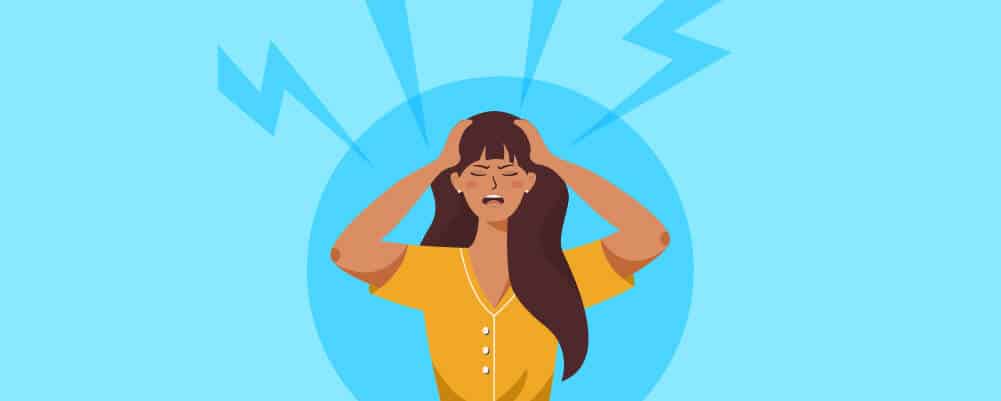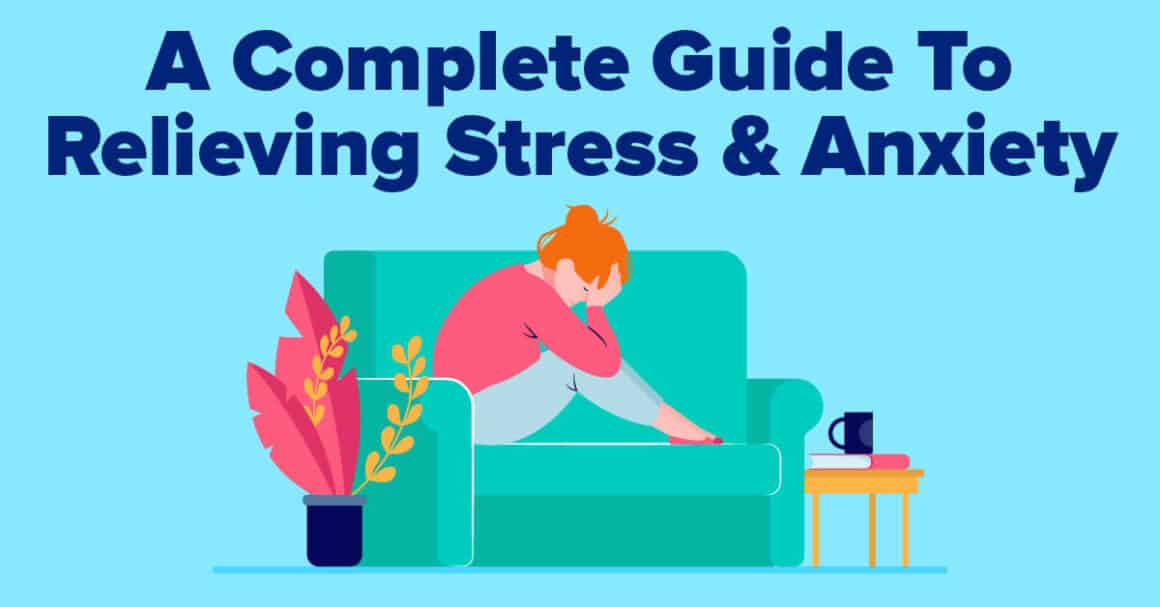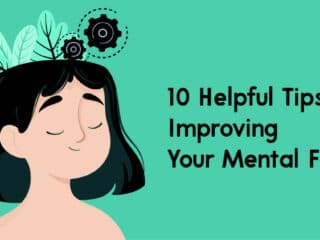Most of us don’t recognize when we are stressed until we reach boiling point and shout at someone who didn’t deserve it.
The best way to relieve stress is to understand when it first appears and actively aim to reduce the cause. Once you find yourself in a happier place, you can set up daily anxiety-relieving activities to help you maintain this healthier mentality.
Of course, it’s one thing to say all of this, and another thing to achieve it. Try not to add to your worries by forcing yourself through your goals; instead, use this article as a guidebook to a calm and happy life.
- What is Stress?
-
How To Identify The Signs of Stress?
- Feelings Of Constant Worry Or Anxiety
- Feelings Of Being Overwhelmed
- Difficulty Concentrating
- Mood Swings Or Changes In Your Mood
- Irritability Or Having A Short Temper
- Difficulty Relaxing
- Depression
- Low Self-Esteem
- Eating More Or Less Than Usual
- Changes In Your Sleeping Habits
- Using Alcohol, Tobacco Or Illegal Drugs To Relax
- Aches And Pains, Particularly Muscle Tension
- Diarrhea And Constipation
- Feelings Of Nausea Or Dizziness
- Loss Of Sex Drive
- Steps To Take When Feeling Stressed And Anxious
- Steps To Protect Yourself From Stress & Anxiety
- Short-Term Stress-Relief Strategies
- The Most Common Types of Stress & Anxiety
- Common Questions About Stress
- Summary
- Related Articles
What is Stress?

Before we go too far into this article, we need to explain what stress is.
Stress is the feeling of being under pressure. This isn’t a physical pressure, like being pushed, but a metaphorical one that makes you overwhelmed. For example, if your workload becomes too large, or if you have an argument with someone you care about and you need to resolve it.
During these moments of upset, you feel threatened, which causes your body to react using a stress response. Although the physical symptoms vary, this response leads you to experience intense emotion.
How To Identify The Signs of Stress?

Understanding the definition of stress and seeing it in yourself or a loved one is not the same thing. To help you navigate through this issue, we created a list of common symptoms of stress to help you see anxiety in your life. Once you know what to look for, it will become easier to understand and relieve your negative feelings.
Feelings Of Constant Worry Or Anxiety
This first symptom might seem obvious, but we shouldn’t ignore it. If you notice that you are worried about normally un-worrisome things, then you could be experiencing stress in another part of your life. Instead of the anxiety staying localized in that one area, it has begun to seep into the worry-free section of your life.
This could mean getting anxious about cooking dinner, even though cooking normally soothes you, or worrying about getting somewhere on time, but you know you’ll be hours early.
This is normally a sign that you have been stressed for a while and require help soon.
Feelings Of Being Overwhelmed
Feeling overwhelmed often has one of two outcomes. The first feels like running on high alert doing everything too quickly in an attempt to get ahead of this looming threat. Moving this fast often leads to errors making you re-do the task and adding more pressure into this problem.
The second outcome is completely shutting down. You end up disconnecting from the situation as your body protects your mind from further upset. While this happens, time moves strangely. You could have zoned out for hours, although it felt like seconds.
Difficulty Concentrating
This “zoning out” effect often leads to difficulty in concentration. You might not realize that time is moving strangely for you. Instead, the problem could lie in staying focused in one area. If that area is the cause of stress, then your mind will try to protect you from it by forcing other jobs or ideas into your mind.
This doesn’t help you in the long run, though. Depending on the task you are avoiding, you most likely have to catch up to it at some point.
Mood Swings Or Changes In Your Mood
Mood swings can be a sign of many different health issues, both mental and physical. If you are experiencing mood swings alongside other symptoms of a mental health disorder, then you should talk to a doctor.
If you have no other symptoms, then you are probably reacting to a stress point in your life. These symptoms could be something as clear as anger towards an inanimate object or as unexpected as laughing at something not remotely funny and being unable to stop.
This could be a sign that your brain needs a rest as the stress is making it hard to regulate your emotions.
Irritability Or Having A Short Temper
Although we have talked about unjustified anger, this type of aggression is slightly different. If you find that you or a loved one is constantly angry or easily irritable, then they could be experiencing the same inability to regulate their emotions. Unlike dramatic mood swings, this short-tempered reaction is often harder to point out, as the outbursts seem logical at the time.
Difficulty Relaxing
When someone is stressed, they will likely avoid the problem due to their anxiety but cannot focus on other things as their mind goes back to the issue. This means that they may try to avoid their issues and force a sense of relaxation without achieving anything.
After spending some time not fixing the problem and not even feeling relaxed, the anxious person often feels guilty for wasting their own time. This then adds to the stress, and the cycle continues.
Depression
The official definition of depression is a “persistent sadness and a lack of interest or pleasure in previously rewarding or enjoyable activities.”
Although this definition is accurate, you are more likely to realize your own depression if you focus on your bodily responses. If you are constantly feeling tired, and have no desire to interact with people or activities, then you are likely feeling the symptoms of depression.
If you are overwhelmed for long enough, then that moment of disconnect can last for days, months, or even years. Try adding a supplement like berberine to your diet. Studies have shown they may be able to work as an antidepressant.
If you notice that you or a loved one no longer has the energy to do more than watch TV, then it’s time to talk to a doctor.
Low Self-Esteem
This sign of stress might seem like a curveball, but subconscious low self-esteem could be what is keeping you locked in your stress-filled spiral.
Self-esteem isn’t only attached to our physical appearance but also our ability to do things. If we become overwhelmed by a task, it is easy to feel incompetent in our skills. If you or anyone else starts to seriously doubt their ability to do something you know you/they can do, then this could be a sign of ongoing stress.
Eating More Or Less Than Usual
Some people use food as a comfort mechanism, while others find their stomach tightening up when they are upset. Both of these relationships with food are not healthy and are a clear sign that something isn’t right.
Stress eating often goes unnoticed until weight gain becomes visible. That’s because this level of self-comfort isn’t seen as unfavorable by the stressed individual. Instead, the food often temporarily helps as they receive endorphins through their snack. However, without the stressful situation being resolved, this temporary fix can lead to other health complications.
Changes In Your Sleeping Habits
As your mind runs wild trying to fix the problem causing you stress, you will find yourself becoming exhausted at unusual parts of the day. Being constantly “on” is a tiring mental state to be in, and if you find yourself needing a nap to get through the day, then this could be a sign of stress.
On the other hand, disconnecting from the world is almost like being in a trance or a semi-sleep. This could mean that you find it hard to sleep at night, as your mind hasn’t been active in the day. This level of insomnia could be a sign of stress or depression.
Using Alcohol, Tobacco Or Illegal Drugs To Relax
If you find that using drugs (legal or not) is the only way you can relax, then what you are searching for is the disconnect moment we talked about before. Instead of your body creating it naturally, you are using an outside force to make the same effects.
This type of mentality often leads to addiction, as your body forgets how to replicate this disconnecting ability by itself.
Aches And Pains, Particularly Muscle Tension
A physical symptom of stress can often be found in tight muscles. As if your body is ready to run or fight off the beast, which is causing you to be scared, your muscles tighten, ready to release power quickly.
Of course, the likely reason for your stress isn’t because of an animal attack. Because you won’t end up running or fighting, this tightened tension doesn’t become released. This has a knock-on effect on your body’s muscles, making them sore and painful due to incorrect use.
Diarrhea And Constipation
In the same way that your muscles are preparing for dynamic movements, the rest of your body is preparing for this fight too.
The adrenaline and serotonin released from your brain eventually settle in your stomach unused. This means that your gut gets the full impact of the adrenaline, causing it to spasm. If enough of these spasms happen, then your colon will overwork your feces causing diarrhea.
However, as the fight or flight signals are running through your nervous system, your brain is telling your body to hold everything in until the danger goes away. Of course, the threat isn’t a beast, and you may be left constipated, waiting for your nervous system to calm down.
Feelings Of Nausea Or Dizziness
The feeling of butterflies in your stomach can be exciting, but if it lasts too long, you end up becoming dizzy or nauseous. This is known as Anxiety Nausea and relates to that unhelpful fight or flight reflex. With adrenaline pumping through your veins, if it has nothing to do, no running or throwing or active movement to accomplish, it will end up in your digestive system. As it stays there, your stomach and gut go into overdrive, causing you to feel as though you have eaten something bad.
If left untreated, you can end up dry heaving or vomiting as your body tries to eject the adrenaline.
Loss Of Sex Drive
The loss of your sex drive comes back to the notion of losing interest in the things that once mattered to you. Some people cannot tell that they have lost interest in something, as they continue to go through the motions anyway, however when it comes to sex, their body isn’t responding as expected.
Either they cannot become erect or produce lubrication. If this is a shock to you, then it can add to your stress levels, making the situation worse.
Steps To Take When Feeling Stressed And Anxious

If you can see yourself or a loved one in any of the symptoms we shared above, then you should start taking steps to reduce the stress levels.
We have created three simple steps to help you start this journey.
Understand When It Is Causing You Problems
When we say “understand,” we mean actively listening to your body and your mind every now and then, so you can pick up on when something doesn’t feel right.
If you realize that you have been zoning out throughout the day, then you may pick up on the early signs of stress. Or, if you notice your neck aching even though you haven’t done anything strenuous, again, this could be a sign of overly tensed muscles through stress.
Picking up on your mind and body’s changes can help you identify your stress levels rising before it becomes too overwhelming.
Identify Its Main Causes
There are normally three types of stressful situations; those that can be fixed through a practical solution, those that can only be fixed through time, and those you have no control over.
Understanding which category your stress fits into can help you figure out how to overcome it.
However, if you cannot identify what is causing your stress, then these categories cannot be used. To figure out what’s going on, you need to evaluate your life and see if anything new or unusual has happened. For example, a looming deadline could be slowly making you more anxious as you creep closer to the target date.
Take your time to figure out if one or more things are causing you stress.
Review Your Current Lifestyle
If you find out that the stress fits into the last two categories above, then you need to review how you deal with this problem. As there is nothing you can do to solve the issue, you need to rethink how you are dealing with it.
For example, if a family member is moving out of your home, there is nothing you can do to stop them. But knowing that this is causing you stress can help you find a new solution. Asking for phone calls and meet-ups could be the solution to staying in contact with your family.
However, if your stress-causing situation is in the first category, you can take a more direct approach to calm your nerves. For example, if you have taken on too much responsibility at work, you can ask for assistance.
Remind yourself that life should be happy and leisurely, so change your lifestyle to allow for relaxation and stress-free living.
Steps To Protect Yourself From Stress & Anxiety

If you are prone to anxious thoughts and stress-filled reactions, then it might be time to protect yourself for when the next wave of emotion comes.
There are a handful of things that you can practice every day to keep your mind and body healthy.
Try to make these steps part of your daily or weekly habits to create a stronger mental force.
Consume Healthy Food
We have already talked about emotional eating, but people that seek this level of comfort often reach for high fat and high sugar foods. This is because they release a lot of endorphins.
However, when you eat sugary foods that have refined carbs (like chips or cookies), it will cause your blood sugar to spike. When the levels eventually come back down, they will do so with a crash, making you more upset and stressed than before.
To get past this, you should aim for foods that still have fats but also have the ability to regulate your energies. For example, slow-releasing foods like pasta are a healthier choice, but eggs and nuts are even better.
You might want to consider adding a mood-regulating supplement like Onnit New Mood to your diet. This supplement utilizes 5HTP and L-Tryptophan to help keep you calm and relaxed.
➡️ Best Lion’s Mane Supplement
Limit Smoking And Alcohol
We have talked about using drugs to create a forced relaxation agent, but if it isn’t medically advised, then you will not have a safe release once the effects wear off.
Self-medicating through smoking, for example, can give you a sense of relaxation as the nicotine enters your bloodstream, but when the nicotine fades, you will go into withdrawal. This will add another layer of stress onto your body, as it craves more nicotine, therefore worsening your anxiety and causing a downward spiral.
Consider Exercising
Any form of exercise, from running to yoga, can act as a stress reliever. As your heart rate rises and your body is moving, you’ll be pumping that hyped-up adrenaline through your body just like it wants you to. As the adrenaline is finally released, you’ll experience a “runner’s high” from the endorphins.
Doing these types of exercises often will help your body regulate that fight or flight reflex, and your body learns how to safely release these impulses.
Take Some Time Off
Weekends, days off, vacations, and downtime are all needed to give yourself a mental break. If your weekends are filled with other work-like activities like looking after someone, running your side-hustle, or anything else which stops you from relaxing, then you aren’t giving yourself enough time to recharge.
This doesn’t mean you should drop all of your responsibilities but instead organize them in a way that allows you to have restful periods. Maybe one day a week is a “no-work” day, or take a whole chunk of time off when your life slows down. Either way, schedule in time off so you can relax without going into the next “thing.”
Be Mindful
Being mindful means being aware of where we are, what we are doing, and what we are capable of.
To practice mindfulness, many people choose to take a step away from their day-to-day activities and connect to the “now.” This often means going for quiet walks, participating in soft yoga, or just allowing a pause in the day.
Connecting to yourself and your mind in these moments of calm can be a helpful way to regulate your emotions and understand what you are feeling. Once you understand your stress and manage your feelings, you can continue through your day with peace.
Get Good Sleep
Getting a good night’s sleep can be hard if you have a million thoughts running through your mind, however you should do all you can to let the rest take you. To help you on your way, you could go to bed earlier and stop drinking caffeine past noon. These two suggestions can give you more time to settle, and you’ll have less energy powering through your body.
➡️ Does Mud Water Have Caffeine?
➡️ Mushroom Coffee – MUD WTR vs Ryze
Don’t Be Too Hard On Yourself
With all of these suggestions, you might become even more overwhelmed. It’s okay; take a breath. Having a bad day or a bad couple of months is a normal human experience, so shove away any feelings of failure that might be drifting around your mind.
Instead, keep everything in perspective. Give yourself a couple of minutes every day to appreciate how well you are doing, and remember to be kind to yourself.
Short-Term Stress-Relief Strategies

If you haven’t got time to truly evaluate your life and your worries, then use these short-term strategies to gain a bit of clarity and calm.
Meditation
Meditation or active mindfulness can be a great way to achieve short-term relief from your stress. Simply take a couple of minutes to sit and quiet your mind. If the worries in your head keep poking through, try repeating a word or noise to block out the other thoughts, or pay attention to what you hear, see and smell and focus on that instead.
Guided Imagery
Guided imagery is the psychological term for going to your “happy place” in your mind. While there, you can take in the senses and immerse yourself in an area that feels safe.
If this area is a memory at the beach, you might hear the slow babble of the water or smell the salt in the air.
The guided part comes from someone walking you through the scene; it could be a recording ready for you to play wherever you need a break or a real person.
Progressive Muscle Relaxation
Progressive Muscle Relaxation is the active desire to relax all the muscles in your body. You start by taking a deep breath and then pick a body part to focus on.
Most people start with their forehead and then move down their toes. As the effect is taking place, you might feel a little shiver run through your body as though you’ve received a massage.
Focus On Breathing
One way in which people know they are stressed and even panicking is because of their shortened breathing patterns. To help you calm down in the moment, you can focus on taking deep breaths. This will slow down your heart rate and allow you to settle.
➡️ Normal Resting Heart Rate For Women
Go For A Walk
Any type of exercise is a great way to relieve stress, but if you haven’t got time to go to the gym, a simple walk around the block could be enough to defuse your tensions. Walking in nature is even more relaxing as you take in the scenery and aromas of the natural landscape.
If you find yourself becoming stressed, take yourself out for a walk or stroll around the office until you manage to break away from your frustrations.
The Most Common Types of Stress & Anxiety

There are many reasons for someone to be stressed or anxious, but the most common explanations come down to these four categories.
Knowing why you are anxious is the first step in stopping it from becoming a recurring issue.
1. Relationships And Stress
The most common reason for stress comes down to our relationships. Of course, we don’t just mean romantic relationships but any type, including friends and family.
Disagreements with the people you love can cause everyone involved to develop a level of stress. Unfortunately, there isn’t an easy fit for these types of struggles, and instead, you should learn when to listen, when to help and when to walk away.
2. Work-Life Balance And Stress
Unfortunately, you cannot use the same “listen, help or walk away” method with your work, as this can cause you to lose your job or gain more responsibilities than you can handle. Instead, if you are finding it difficult to balance your work and personal life, you should consider talking to your manager about lowering your workload or cutting down your hours.
Do not try to push yourself too much, as “burnout” can cost you more than a bad report. It can lead to serious physical and mental health problems.
3. Money And Stress
Debt and money can be the cause of so many stressful moments. Between 2012 and 2014, the economic crisis swept through most of the world, a debt charity called StepChange had a massive 56% increase in demand for advice.
The people who were calling didn’t necessarily need to go into bankruptcy, but they did need support to help them through this depressing situation.
In these conversations, people talked about suicidal thoughts and an inability to see a future.
4. Smoking, Drinking And Drug Use And Stress
Because smoking, drinking and using drugs cause the body to receive a small high, it doesn’t take long for mentally healthy people to develop a new layer of stress. Constantly wanting to get that high back, the body goes into withdrawal, forcing the user to experience an anxious need to get more of the substance.
This can lead to financial problems, work-based problems, and relationship problems as the desire for more takes over.
Common Questions About Stress

Can Stress Be Positive?
Despite all of this negative talk about stress, there is a positive side to it. Stress makes you alert to the dangers around you and can help you perform physical tasks better. However, this burst of help is only temporary, and pushing yourself like this for too long will drain all of your energy.
What Can Prolonged Stress Lead To?
Although stress is a mentally upsetting problem, if left unchecked, it can lead to physical problems too.
Being stressed for a long period of time can lower your immune system, meaning you are more susceptible to viruses and bacteria. It can also overwork your digestive system creating Irritable Bowel Syndrome (IBS).
What Happens To My Body When I Experience Stress?
Everyone reacts differently when it comes to stress; some people can’t sleep, others can’t eat, and some find themselves picking at their eyebrow hairs.
The reason for all of this strange behavior is because your body is going through a ”fight or flight” reflex, while your mind is aware that it doesn’t need to run away or fight off anything.
The fight or flight response is meant to help you escape danger, so you receive adrenaline and noradrenaline hormones to power your body through this emergency. Because you aren’t being physical at this moment, this energy goes to waste, and you are left tense and over-stimulated about your surroundings.
What Are The Main Behavioural And Emotional Effects Of Stress?
There tend to be two strong emotional effects to stress, these are irritability and tearfulness.
If you become irritable, every little thing can upset you, giving you a short temper that could go off at any minute. If you are a tearful person, then again, little things could set you off into a negative spiral. Overly crying can also lead to headaches and dehydration.
What Causes Stress?
Anything can cause stress, but it normally comes from being overworked; this could be from your job, family, social commitments, etc. Another reason to be stressed could be a lack of control; for example, you could be experiencing life-changing events like bereavement, divorce, or job loss.
Summary
If you find yourself overreacting to small upsets, you are probably feeling anxious and stressed. Try to calm down by taking slow breaths and going for a walk. Once you have managed to steady yourself, you should try to find the source of your stress and work on relieving it. Remember that if you leave yourself in this state for too long, it can have consequences for your physical health too.
Related Articles
Best Supplement For Regular Bowel Movement
Best Colostrum Supplement for Adults
Best Aluminum Free Deodorant for Men











